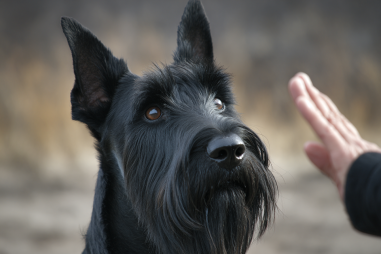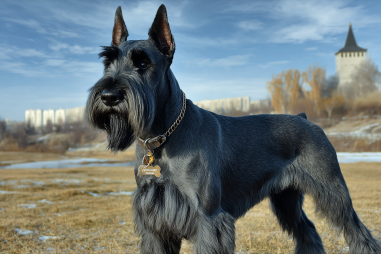Giant Schnauzers are robust, intelligent, and loyal dogs that make excellent companions and protectors. However, like any breed, they can develop certain behavioral challenges if their needs aren’t properly met. Understanding how to identify and manage common behavioral issues in Giant Schnauzers is crucial for maintaining a happy and well-balanced pet. In this article, we’ll explore typical behavioral problems, their underlying causes, and effective strategies to help your Giant Schnauzer thrive both mentally and emotionally.
Overview of Typical Behavioral Issues
Giant Schnauzers are known for their intelligence and strong-willed nature, but these qualities can sometimes manifest as problematic behaviors if not guided properly. Some of the most common behavioral issues reported by owners include:
- Aggression: This can be directed toward strangers, other animals, or sometimes even family members, especially if the dog feels threatened or insecure.
- Separation Anxiety: Giant Schnauzers form strong bonds with their families and may become distressed when left alone, leading to destructive chewing or excessive barking.
- Excessive Barking: As natural watchdogs, they tend to be vocal, but loud or constant barking can become a nuisance without proper training.
- Destructive Behavior: Boredom or lack of mental stimulation often leads them to chew furniture, dig, or engage in other destructive habits.
- Resource Guarding: Some Giant Schnauzers may display possessiveness over their food, toys, or territory, which can escalate if unaddressed.
Causes and Warning Signs
Identifying the root causes of behavioral issues is the first step toward effective management. The most common factors that contribute to these behaviors in Giant Schnauzers include:
- Lack of socialization: Insufficient exposure to a variety of people, environments, and other animals during puppyhood can lead to fear or aggression.
- Insufficient exercise: These large, energetic dogs require ample physical activity. Without it, pent-up energy can turn into frustration or hyperactivity.
- Inadequate mental stimulation: Giant Schnauzers are highly intelligent and need challenging tasks and training to keep their minds engaged.
- Inconsistent training and boundaries: Mixed messages from owners or lack of clear rules can confuse your dog and lead to behavioral issues.
- Stress or anxiety triggers: Changes in environment, routines, or the presence of unfamiliar people can unsettle a sensitive Giant Schnauzer.
Common warning signs to watch for include growling, lip licking, avoidance, excessive barking, pacing, and destructive chewing. Early recognition of these behaviors can prevent escalation and help you intervene timely.
Training and Management Strategies
Successfully managing and correcting behavioral issues in your Giant Schnauzer requires consistency, patience, and positive reinforcement. Here are some effective training strategies:
- Positive Reinforcement: Reward desirable behaviors with treats, praise, or playtime. This encourages your Schnauzer to repeat these actions.
- Early Socialization: Introduce your puppy to different people, animals, and environments gradually and positively to build confidence and reduce fear.
- Obedience Training: Teach basic commands and build a strong foundation of respect and communication. Regular training sessions keep your dog mentally focused.
- Exercise: Provide daily walks, runs, and play sessions to burn off physical energy and reduce destructive behavior.
- Structured Environment: Establish clear rules and routines. Consistent boundaries help your Giant Schnauzer understand expectations and feel secure.
- Redirect Problematic Behaviors: When your dog exhibits unwanted behavior, calmly redirect them to a preferred activity like a chew toy or obedience command.
When to Seek Professional Help
Despite your best efforts, some behavioral problems may persist or worsen. It is important to recognize when to involve a professional for tailored support. Consider consulting a qualified dog trainer, behaviorist, or veterinarian if your Giant Schnauzer:
- Shows signs of severe aggression or biting
- Exhibits extreme separation anxiety that leads to self-harm
- Demonstrates uncontrollable destructive behaviors
- Has sudden behavioral changes without an apparent cause
Professionals can assess your dog’s behavior, diagnose underlying issues, and develop customized treatment plans, which may include behavior modification techniques or medication in some cases.
Preventative Measures
Prevention is always better than cure, and many behavioral problems can be minimized or avoided through proactive care. Some preventative steps include:
- Puppy Socialization Classes: Enroll your Giant Schnauzer puppy in well-supervised classes early on to expose them to new experiences in a controlled setting.
- Consistent Routine: Keep regular feeding, walking, and training schedules to provide structure and stability.
- Early Training: Begin gentle obedience training as soon as possible to build good habits and healthy communication.
- Mental Enrichment: Rotate puzzle toys, obedience games, and interactive activities to keep your dog’s mind sharp and content.
- Safe Alone Time Practice: Gradually condition your Giant Schnauzer to feel comfortable being alone by increasing separation periods slowly and providing comfort items.
Supporting Mental Health
Ensuring your Giant Schnauzer’s mental well-being is just as important as managing physical health. Here are some ways to support their mental health throughout their life:
- Regular Interaction: Spend quality time engaging in play, training, and affection to strengthen your bond and provide emotional security.
- Varied Activities: Challenge your dog with new experiences such as scent work, agility, or advanced obedience to prevent boredom.
- Relaxation Time: Create a calm, safe space where your Giant Schnauzer can unwind and feel secure after activity or stimulation.
- Monitor for Stress: Pay attention to subtle signs of anxiety and address them promptly with soothing techniques or professional advice.
A balanced combination of exercise, mental challenges, and emotional support helps your Giant Schnauzer develop resilience and enjoy a happier life.
Helping Your Giant Schnauzer Thrive
Behavioral challenges are a natural part of owning any dog, but with the right knowledge and commitment, you can guide your Giant Schnauzer toward becoming a well-adjusted and joyful companion. Early recognition, consistent training, proper socialization, and mental stimulation form the backbone of effective management. When necessary, don’t hesitate to seek professional guidance to tackle stubborn or severe issues. By investing time and care into your Giant Schnauzer’s behavioral health, you’ll nurture a loyal, confident, and loving friend for years to come.







